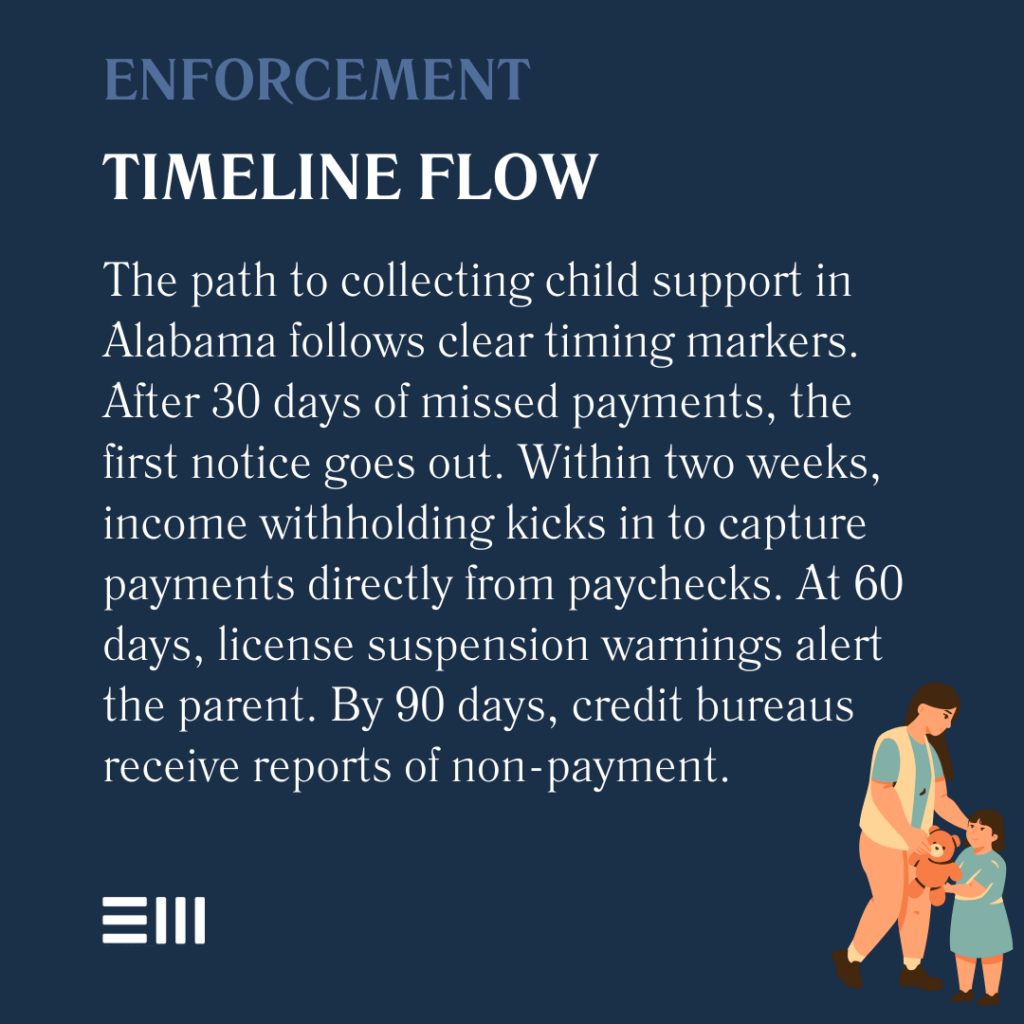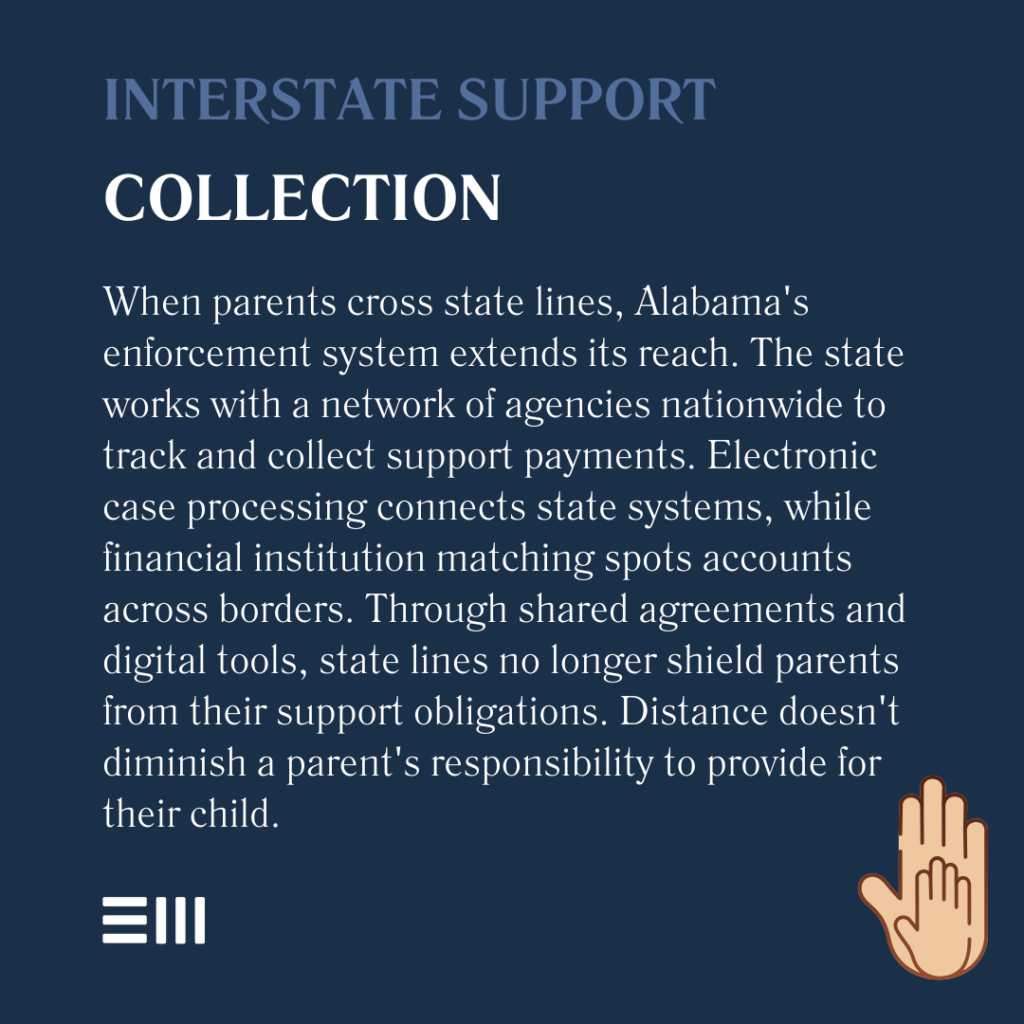
In Alabama, unpaid child support totals over $4 billion, affecting more than 210,000 children across the state.
Behind each dollar owed stands a child whose basic needs hang in the balance, making enforcement not just a legal matter but a cornerstone of family stability.
Each month, thousands of Alabama families navigate the complex web of support enforcement, seeking financial security for their children’s future.
Understanding Alabama Child Support Enforcement
The Alabama Department of Human Resources (DHR) operates a robust enforcement system to ensure children receive their court-ordered support.
Their enforcement division handles over 250,000 active cases annually, utilizing multiple methods to secure payments.
From automated systems to court interventions, Alabama’s enforcement toolkit serves as a comprehensive approach to collecting child support.
Available Enforcement Methods
When support payments fall behind, Alabama’s DHR employs numerous tools to ensure collection.
These methods range from administrative actions to serious legal consequences, each designed to address different non-payment situations:
- Income withholding orders automatically deduct support from paychecks, capturing 75% of all collected payments;
- Tax refund intercepts claim both state and federal returns for past-due support;
- License suspension affects professional, recreational, and driver’s licenses;
- Property liens prevent the sale or transfer of assets until support is paid;
- Bank account seizures capture funds from checking and savings accounts;
- Credit bureau reporting impacts the non-paying parent’s credit score; and
- Passport denial prevents international travel for those owing $2,500 or more.
These enforcement methods have proven effective, with Alabama collecting over $320 million in child support annually through various channels.
Administrative Enforcement Actions
Behind the scenes, Alabama’s DHR employs sophisticated administrative processes to track and enforce child support orders. These systematic approaches ensure consistent monitoring and action:
- Automatic payment tracking through the Alabama Child Support Payment Center;
- Case monitoring for missed payments and enforcement triggers;
- Electronic matching with employer databases;
- Interstate cooperation for out-of-state enforcement;
- Automated notices for payment delinquency; and
- Regular case reviews for enforcement effectiveness.
Through these administrative measures, Alabama maintains one of the Southeast’s most efficient child support enforcement systems.
Legal Enforcement Options
When administrative methods prove insufficient, Alabama courts provide powerful enforcement tools.
The judicial system stands ready to enforce support orders through various legal mechanisms that carry serious consequences for non-payment.
Court Enforcement Measures
The courts maintain several effective methods for compelling child support payment, each carrying significant weight in ensuring compliance:
- Contempt proceedings can result in jail time for willful non-payment;
- Wage garnishment orders capture up to 65% of disposable income;
- Property seizure orders force the sale of assets;
- Show cause hearings require explanation for non-payment;
- Judgment interest accumulates on unpaid support; and
- Attorney fee awards compensate for enforcement costs.
These judicial enforcement tools demonstrate Alabama’s commitment to ensuring children receive their court-ordered support.
Enforcement Timelines and Procedures
The enforcement process follows specific timelines designed to balance prompt action with due process. Understanding these timelines helps both parties navigate the system effectively.
Standard Enforcement Steps
Alabama’s enforcement process follows a structured timeline, ensuring fair and consistent application of enforcement measures:
- Initial notice of delinquency after 30 days of non-payment;
- Income withholding activation within 14 days of notice;
- License suspension warnings after 60 days of delinquency;
- Tax intercept certification for debts over $500;
- Credit reporting after 90 days of non-payment; and
- Legal action initiation after administrative remedies fail.
This systematic approach ensures all parents receive fair treatment while maintaining effective enforcement.

The Role of Employers
Employers play a crucial part in child support enforcement, acting as key partners in the collection process.
Their responsibilities include:
- Processing income withholding orders within 14 days;
- Accurately reporting new hires to state databases;
- Remitting withheld support payments promptly;
- Maintaining records of all support-related transactions;
- Notifying DHR of employee terminations; and
- Complying with multi-state withholding orders.
Employer compliance significantly increases successful collection rates, benefiting Alabama’s children.
Interstate Enforcement
When parents live in different states, Alabama’s interstate enforcement program ensures support orders remain effective:
- Participation in the Uniform Interstate Family Support Act (UIFSA);
- Coordination with other states’ enforcement agencies;
- Electronic interstate case processing;
- Multi-state financial institution data matching;
- Reciprocal enforcement agreements; and
- Collaborative collection efforts.
Interstate cooperation has dramatically improved collection rates for out-of-state cases.

Frequently Asked Questions About Child Support Orders in Alabama
Parents seeking answers about child support enforcement in Alabama often face complex situations.
These responses address the most common concerns.
How Long Does Enforcement Take to Begin?
Enforcement actions typically start 30 days after a missed payment, with income withholding being the first step.
What if the Parent Lives in Another State?
Alabama participates in interstate enforcement programs, allowing coordination with other states’ agencies to collect support.
Can Enforcement Be Stopped if Payments Resume?
Most enforcement actions cease when regular payments resume and past-due amounts are addressed through a payment plan.
What Happens if the Parent Is Self-Employed?
Self-employed parents face the same enforcement measures, though collection may require additional steps like bank account levies or property liens.
How Are Enforcement Costs Handled?
Enforcement costs are typically added to the support debt, with the non-paying parent responsible for fees.
Take Action for Your Child’s Future
Your child deserves financial support, and we understand the complexities of enforcement in Alabama.
Let our experienced team help you navigate the enforcement process and secure the support your child needs.
Contact Baxley Maniscalco today to discuss your child support enforcement options and create an effective collection strategy.
Can't find what you're looking for? Search our site below.










